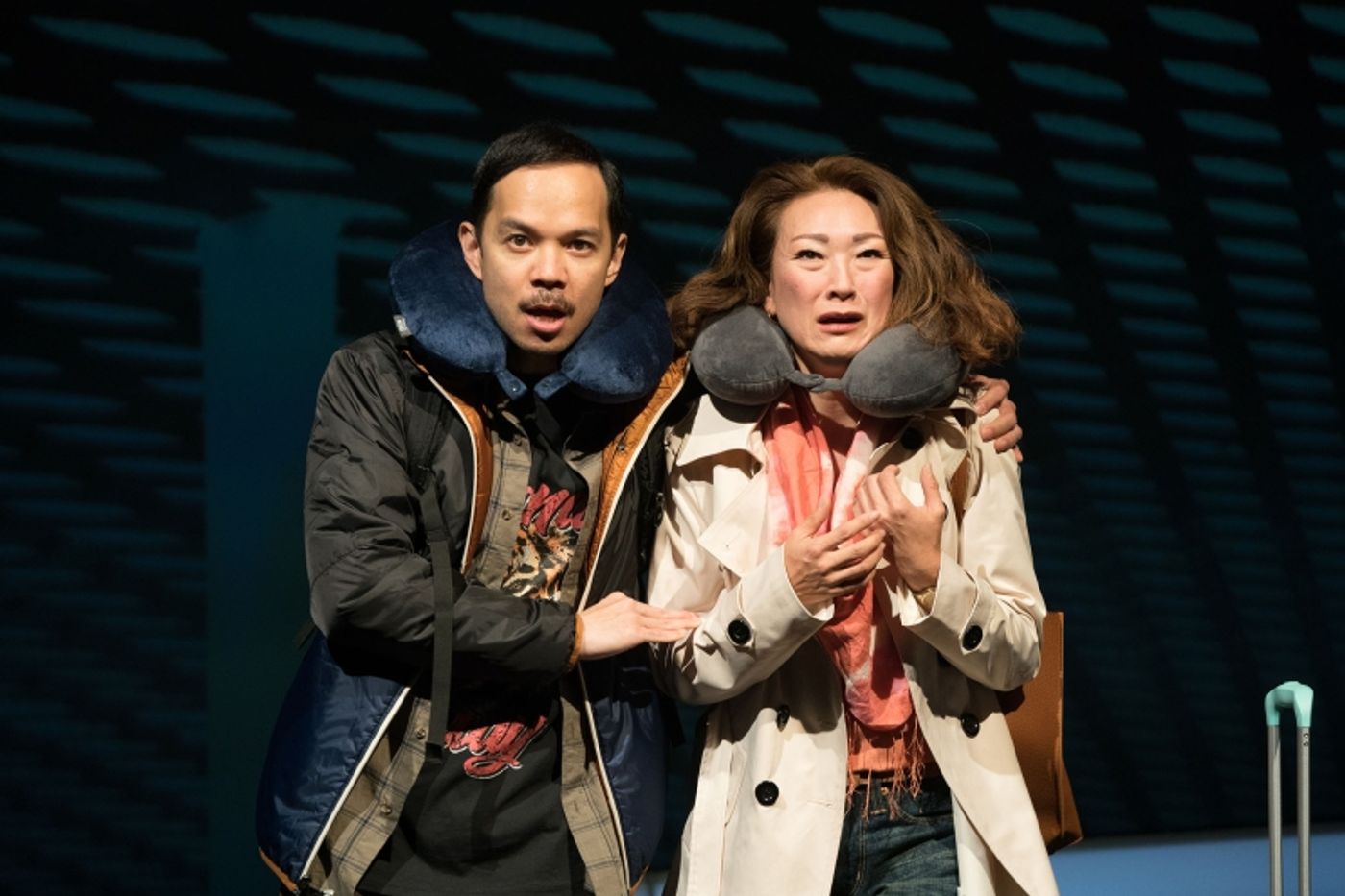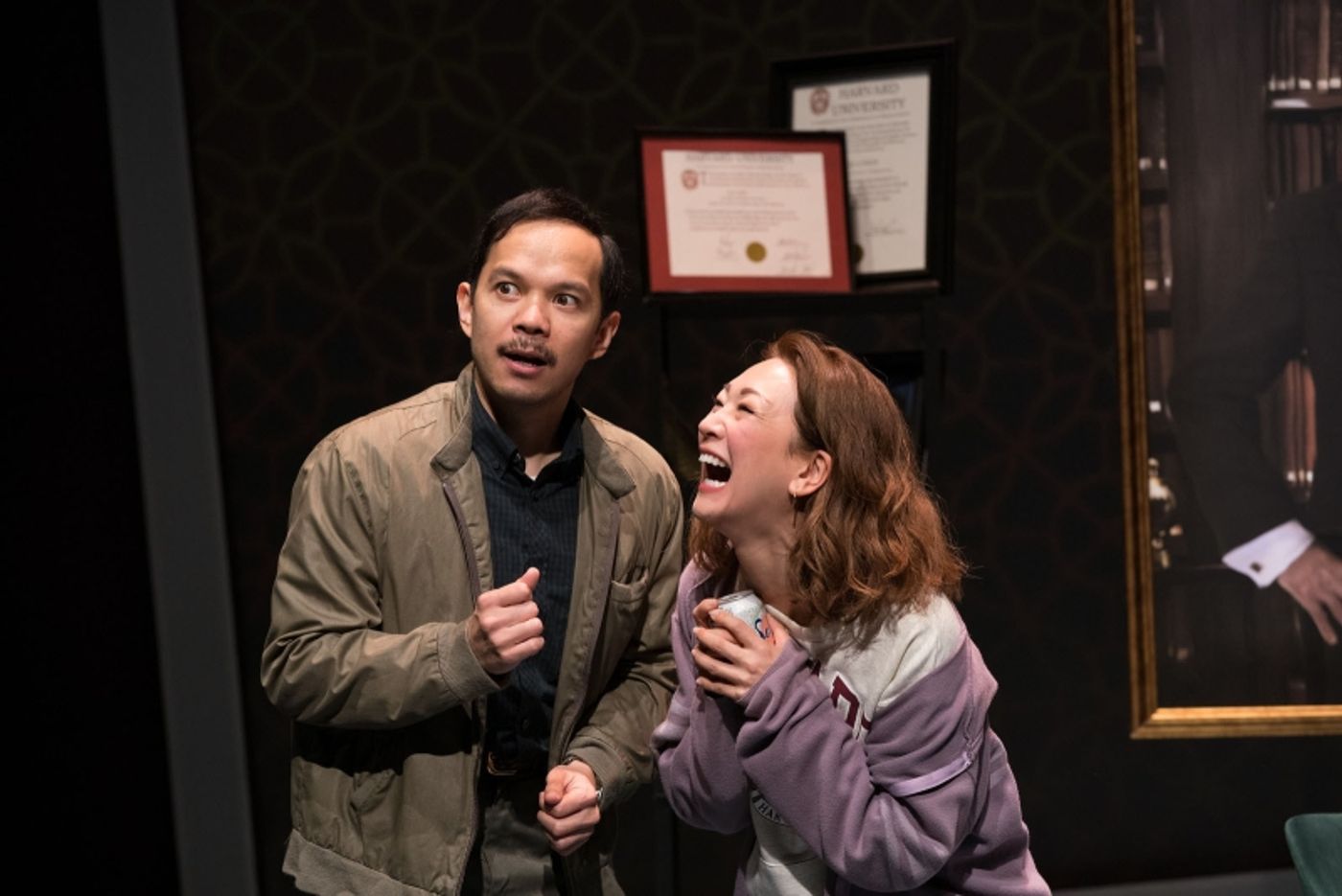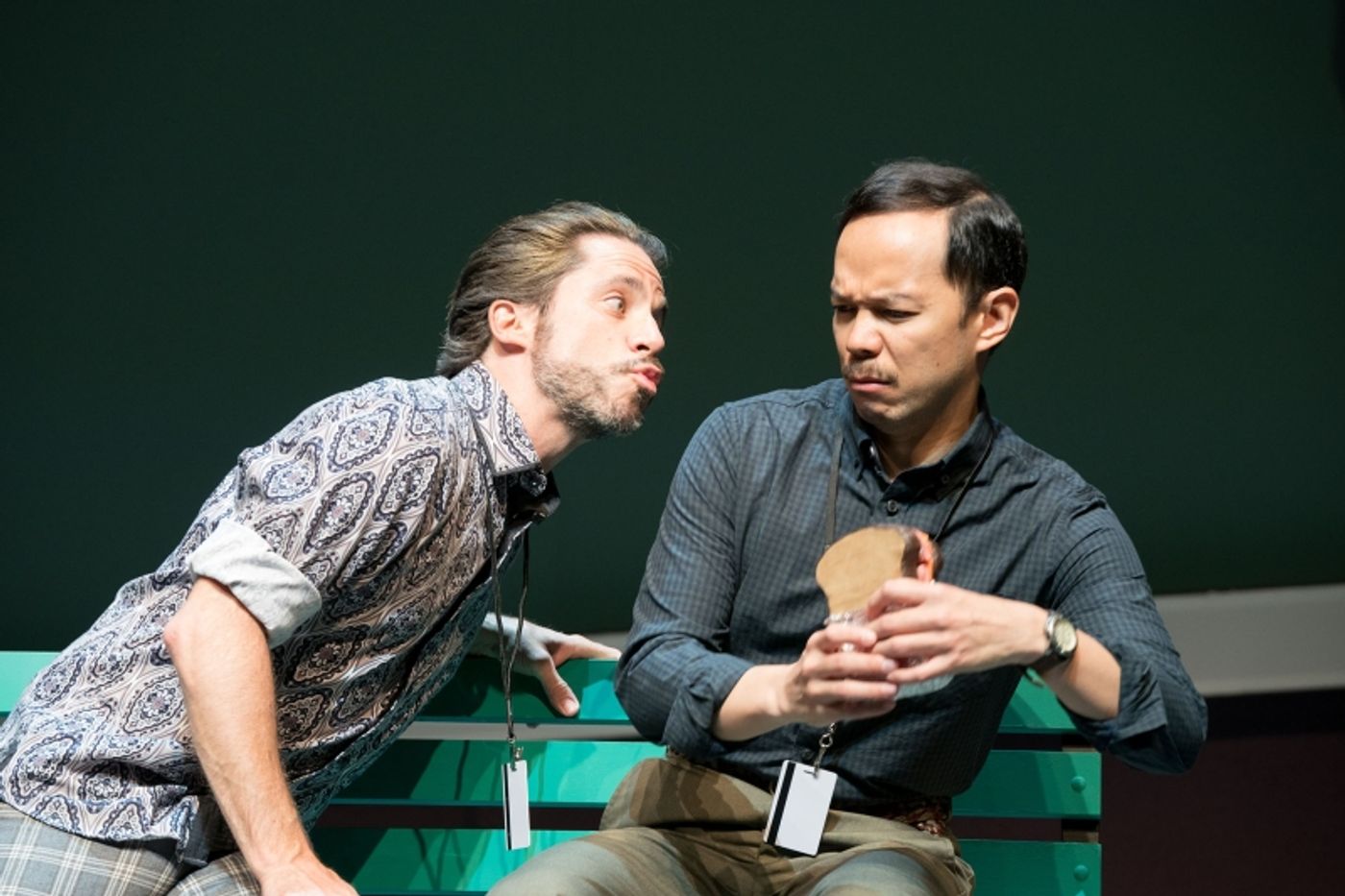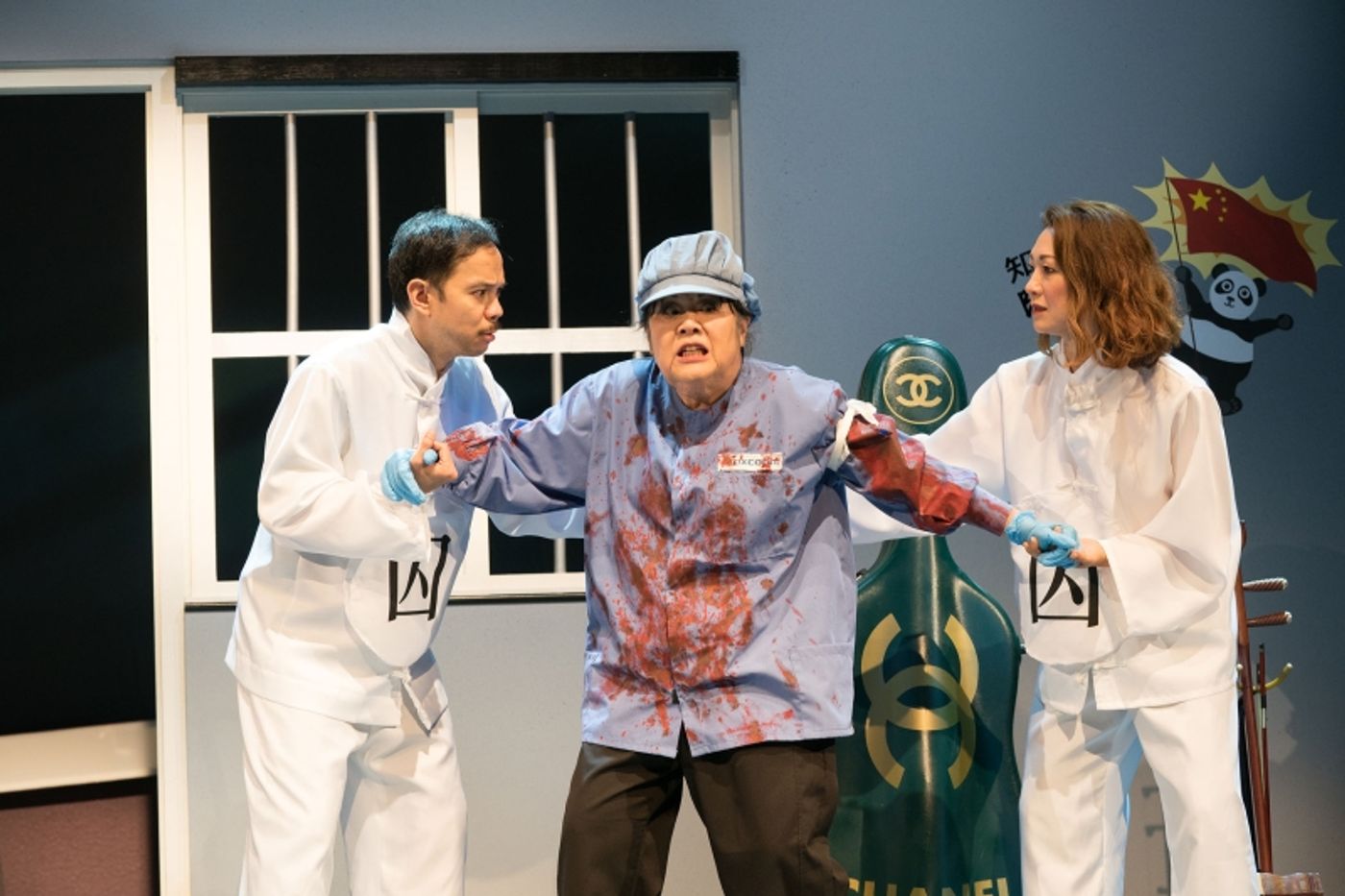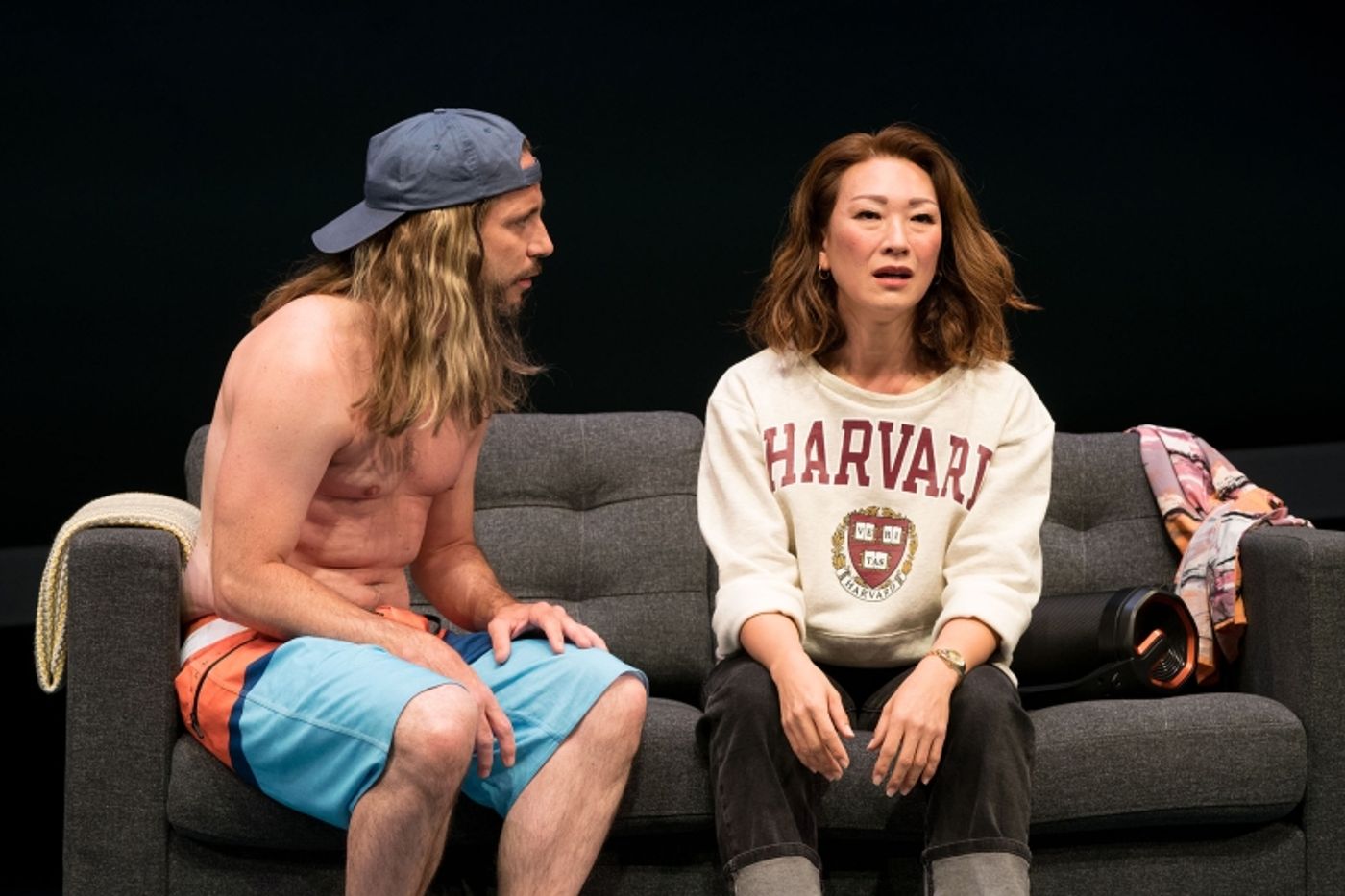Review: Satirical Play TIGER STYLE! Mocks Stereotypes at South Coast Repertory
Mike Lew's wild satire skewers Asian-American tropes and stereotypes that is at once uproariously funny but also uncomfortably relatable.
Funny, outrageous, and surprisingly thought-provoking beneath all its biting sarcasm, Mike Lew's reverberating satire TIGER STYLE!---now on stage at OC's South Coast Repertory in Costa Mesa through June 5, 2022---shines a riotous light on the merits of demanding hard work and high-caliber achievements from second- and third-generation children of Asian immigrants, and whether or not such a strict, method of upbringing results in happy, well-rounded, and contented adults later in life. Surprisingly enough, the answers to that query may still be up in the air.
Using exaggerated situations generously doused with pop culture references and sight gags that aim to elicit hearty laughs as it wickedly skewers most stereotypes and tropes that have sadly been attached to the AAPI diaspora, the play fashions a series of increasingly escalating but hilarious scenarios over two acts that befalls a pair of American-born, Harvard-educated Chinese-American adult siblings living relatively comfortable, financially-stable lives in Irvine (ha!) but have presently found themselves feeling a bit (well, okay, enormously) in flux... and are now, thus, seeking ways to jolt their lives out of it.
At first the pair is presented to seemingly embody the very stereotypes the play will eventually work hard to up-end.
On one side is Albert Chen (the expressive Jon Norman Schneider), a smart, quietly hard-working computer coder whose go-with-the-flow work ethic involves collecting a paycheck while "work[ing] hard and not mak[ing] waves," and "making sacrifices for the good of the group." On the surface, he resembles the unfortunate trope of the asexual introverted Asian nerd whose as reliable as he is, um, non-threatening.
Shaped by his willingness to do honest, good work coupled with the discipline that has been imbedded in his DNA since childhood, meek Albert becomes more boisterous with his complaints about being passed over for promotions or not getting credited for groundbreaking work... but then doesn't do much about it (well, at first).
Dang, talk about having #FirstWorldProblems! Making a relatively comfy (but apparently not good enough) $75K a year, he feels "stuck" in a work environment that is perpetually condescending and unfair towards him.
How? Well, at this company, his boss (the very versatile Ryun Yu, back from a bout with COVID) purposely ignores his good merits so as not to be seen to be giving preferential treatment to a fellow Asian co-worker. Meanwhile, his charming but hyper-idiotic white co-worker, nicknamed "Russ the Bus" (amusingly played by Derek Manson), is a walking, breathing stereotype of that slimy workplace tool (you know, that annoying guy in your office) that works little but is praised lots. Thus, it is not surprising that the office blowhard is promoted above Albert and becomes his supervisor. Even worse, the guy is also given a substantial raise as a reward for seemingly, well, existing.
To add more salt to his "wounds," the frustrated Albert is currently living with his older, more successful sister Jennifer (the spirited Amy Kim Waschke), renting a room in her house for what he claims to be simply "tax purposes."
But big sis isn't chipper either.
For her part, the often manic Jennifer isn't feeling very fulfilled as well. Despite being a highly successful doctor---who, in the recent past, was also (wow!) an acclaimed musician that has performed at Carnegie Hall---Jennifer isn't happy with her off-work life, particularly when it comes to her fracturing relationship with her surfer-haired, car stereo installer boyfriend Reggie (also played by Manson, one of his multiple funny roles slathered in cringe stereotypes).
A pre-planner that likes to organize her life in neat, indexed lists, Jennifer is, for lack of a better phrase, a control freak. Natch, she goes berserk when things don't go her way. She is genuinely perplexed by why her professional success hasn't trickled down to her love life, which is probably why she finds herself shrieking and pleading like a hysterical teenager to keep her bum of a boyfriend from leaving her.
"We got a 96% on OK Cupid!" Jennifer cries out, devastated by her beau's abrupt departure. "96... is an A!"
Ha!
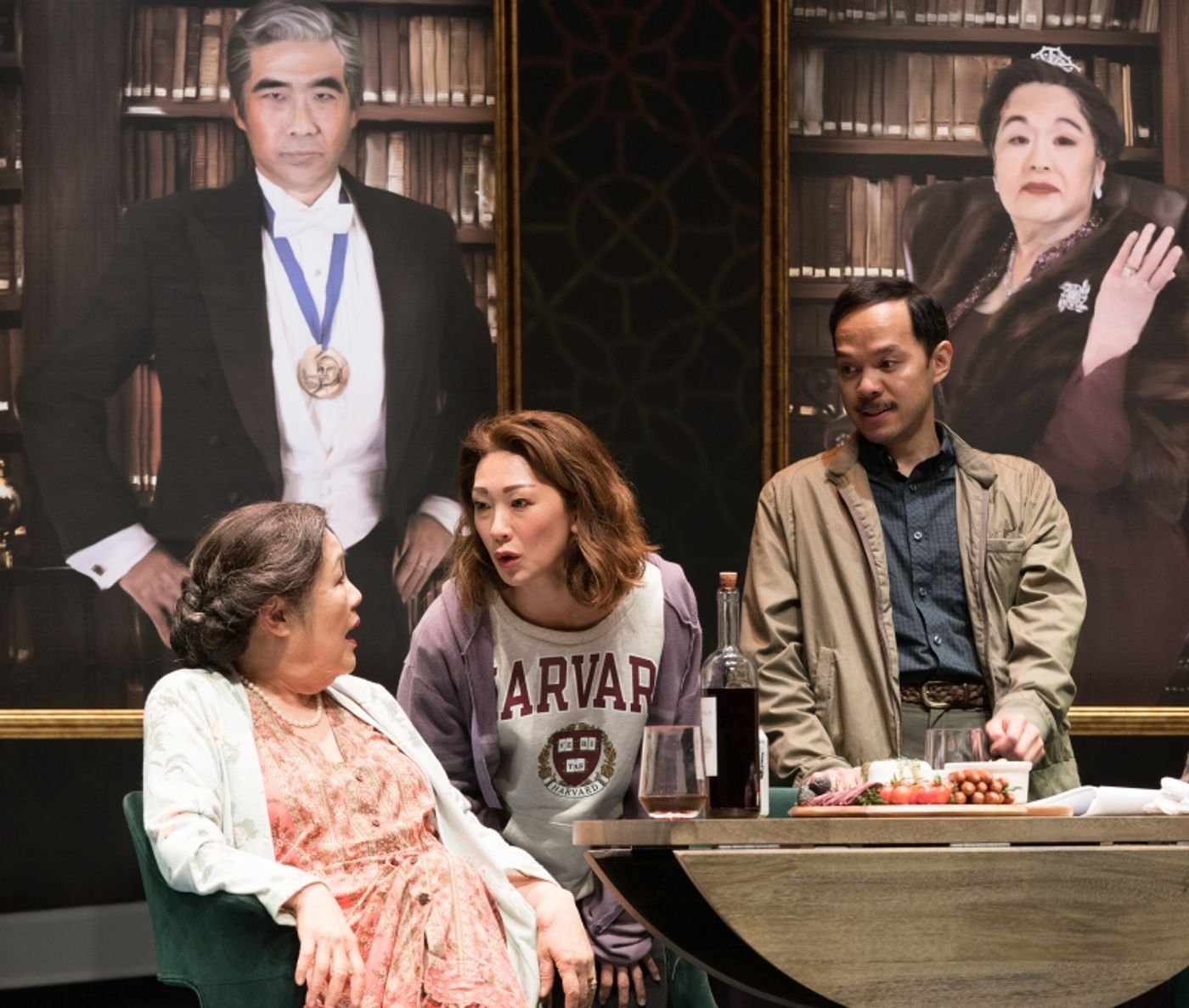
and Jon Norman Schneider
Essentially, the siblings both think they deserve better, not only in their professional careers but also with their personal lives, especially since they have been conditioned from an early age to be successful with academic and status-gaining endeavors. So why aren't they successful with everything else?
Understandably, they question each other why. Could it be because, despite their academic "pedigree" and their perceived adherence to the (otherwise problematic) "model minority" myth, they are still unable to shake being seen as an "other" in White America no matter what they do?
Or is it perhaps because they are both archetypal products of "Tiger Parenting"---the controversial child-rearing parenting style that follows the East Asian, South Asian, and Southeast Asian method of strict parenting, first labeled and popularized by Amy Chua's memoir Battle Hymn of the Tiger Mother?
Were Albert and Jennifer's parents---armed with such traditional, Old World methods---so intent in demanding only unrealistic high achievements as taught by Eastern standards (sans emotional support or tender, encouraging affection) that they neglected to give equal due diligence to other aspects of being a "success" in life that would have better prepared them with life skills as future Chinese-American adults in the United States?
Naturally, like an easy scapegoat to bellow from a psychiatrist's couch, the siblings put the blame most squarely on their "Tiger Mom" (Gilmore Girls' lively Emily Kuroda) and their "Tiger Dad" (also played with deadpan brilliance by Yu) for their current inability to have well-rounded lives. In an act of delayed rebellion, the brother and sister tag team summon up some dormant chutzpah to confront their parents during dinner, to finally "admonish" them for their use of a parenting style that decidedly leaned more Chinese than "American."
They are utterly gobsmacked when their parents greet their protests with a resounding... meh ... and rounds of laughter at their ridiculous notion. Jennifer and Albert's parents explain that they sacrificed and scraped by in order for their kids to have a better chance at the so-called American Dream, which also meant that the kids, in return, needed to put in the work, too, and show gratitude for it. Dad also relays a stirring story about his own immigrant father's struggles as a new immigrant, demonstrating just how unappreciative such a complaint seems in hindsight.
Along with the audience, the parents laugh at their futile exercise and admonish them right back for being whiny and ungrateful (hilariously, the family dining room is decorated with large portraits of Mom and Dad dressed like royalty---a very funny sign that they are indeed the rulers here).
While the first act finds Albert and Jennifer mostly whining about their lot and life---shouting shrill protests and blaming their parents for not helping them prepare for this part of the real world---the second act takes a more colorful but jarring detour, where the siblings---after failing to get satisfaction out of their parental confrontation and as an after effect of some of their sudden life decisions---decide to go the opposite route and fully "embrace their Chinese side" instead.
This plan involves going on what they have dubbed their "Asian Freedom Tour"---in which they will ditch American life (where they're treated as an "other" anyway by everyone) and travel to the land of their ancestors---particularly, the seemingly modern metropolis of Shenzen, China's Special Economic Zone. Surely, there, they will finally be free of racial bias and feel embraced for who they are... right?
For much of the play, the brother and sister duo come off incredibly self-centered and, um, kind of unlikeable, probably by design. Do I agree with some of what they are complaints, though? Regrettably, LOL, yes. Are their predicaments and shenanigans funny? Oh, absolutely.
It should be noted, though, that TIGER STYLE! is not just a play to be enjoyed solely by an exclusively Asian audience, but there's no denying that it does offer an extra loaded layer for those that are. Speaking as a child of Asian immigrants myself---one that has spent the majority of my life here in the United States---the play certainly spoke deeply to me and, unsurprisingly, triggered many memories and emotions imbedded in my cumulative personality that have shaped the shaky middle-ground that I've become accustomed to: a very personalized one that allows me to navigate the so-called "American" way of life, while still standing up and feeling proud of my culture and its many traditions, customs, and ideologies (with wiggle room for even aspects I disagree with, but that's a separate issue for another time).
I understand that both Albert and Jennifer are struggling with this very same thing, albeit handled in a manner much more farcical and outrageous rather than grounded and realistic---and that's... okay.
But, admittedly, at times, my friend and I (both of us are Asian---I am Filipino, my friend is Chinese-American) experienced conflicting feelings while watching the show's first Wednesday night performance that had us furiously texting long after the show (and the post-show talkback) ended.
During many moments played for laughs, we both felt a little uncomfortable laughing at their expense, even fully aware that this is a comedy/satire---as if we were laughing at people like us and at situations people like us have been through or are still confronted with daily. That feeling of slight guilt may seem trivial, but such cathartic responses are still notable in what this play may elicit with individual audience members who will have varying take-aways from this richly layered material.
It also felt really odd laughing heartily alongside my fellow non-white theatergoers. Are they simply laughing at the sheer absurdity on display or are they laughing at (but completely missing) the uncomfortably real implications of what is happening to these characters without the layer of cultural familiarity that comes with knowing intimately what they are enduring?
And that, I feel, is why TIGER STYLE! is a sneaky bit of brilliant satire. The extremes and outlandishness displayed in the play are purposely played for laughs---and not all of them are neat, tidy ones with clear-cut punchlines.
Arguably, many expect such characters to, yes, fall into that trope of the agreeable, nice "model minority" that many may be expecting. Nope! These siblings are shrill, irrational, and extra cray-cray... pushing themselves decidedly arms-length away from expected behavior, which can be uncomfortable to see sometimes, especially when we've been conditioned a certain way. Here, the ridiculousness acts as a way to reflect, then deflect, then distort, then up-end all over again twice more.
While Act 1 portrays our two main characters as seemingly incomplete, Act 2 shows their naïveté.
After intermission, TIGER STYLE! tries its best to mesh real danger with over-the-top farcical elements, but the overall effect can sometimes be a mixed bag. While I certainly do empathize with some of Albert's and Jennifer's societal struggles as Asian Americans (Jennifer's boyfriend got with her because he saw her as "exotic," Albert does good work but is unrewarded and uncredited because he prefers modesty over boastful self-promotion), their buffoonery in the second act---as they become embroiled in the harshness of a foreign land---teeters on the mostly absurd, which is perhaps why they don't truly earn the audience's care until the very end when it is much, much too late and the stakes are seemingly inescapable.
Uproarious and kinetic, TIGER STYLE!'s nimble uniqueness is fully realized thanks to its stunning visual elements and the stellar work of its excellent cast. Director Ralph B. Peña stages the production like a gradually speeding locomotive, gaining urgency and chaotic energy as it trudges along as if purposely heading for a collision course.
Meant to feel like a window to a strange alternate world, the main stage features a twisted-frame proscenium that resembles a jagged-edged tunnel to a tangent of the multiverse conceived by scenic designer Se Oh, combined with vibrant and often askewed projected backgrounds designed by Hana S. Kim and striking lighting by designer Tom Ontiveros. Hyun Sook Kim's costumes pair each actor with a color palette that reflects their personalities---the siblings are adorned in mostly solid "safe" colors, while the people they interact with are almost always in louder color combos by contrast.
And as the erratic Chen siblings, Schneider and Waschke have a wonderfully over-the-top rapport that volley off each other really well. Leaning into the show's amped up comedy rather intuitively, both have impeccable comic timing that even has a tinge of competitiveness. I'd say it was a draw when it comes to who hams it up more over the other.
Mad (hehe) props to the play's trio of talented players that provide each of their multiple unique characters their own palpable personalities and traits.
Kudos to Manson for the unenviable task of giving life to, well, essentially the play's icky exaggerated stereotypes with animated pep: annoying über-bro Russ the Buss, Jennifer's Cali-accented boytoy Reggie, and, scariest of all, his turn as the gatekeeping Customs Agent at LAX, wielding privilege and power with every word he utters.
The brilliant Kuroda is just terrific in her turns as the not-putting-up-with-your-shit Momma Chen, Jennifer's exhausted psychotherapist, the mysterious Cousin Chen, and Jennifer's Shenzen matchmaker. Though, admittedly, I already had a soft spot for her thanks to spending 7 seasons as the ultimate Tiger Mom Mrs. Kim on Gilmore Girls, I cannot help but be newly awed by her varied work here.
A post-show talk-back session following Wednesday evening's performance illuminated for remaining audience members that it was Yu's first night back in TIGER STYLE! since being shut out due to getting COVID, and judging by his work during the show, it was certainly a welcome return.
Armed with rapid-fire, tone-perfect dialogue skills, Yu---who overcomes a few first night back line stumbles with remarkable tenacity, understandable after battling sickness for days---is superb as nosy Chinese national Tzi Chuan, Albert's nonchalant boss Melvin, the intimidating General Tso (ha!), and, most of all, as Daddy Chen who delivers a very poignant story about the due respect owed to our parents and grandparents who struggled to build new lives here in America.
At times irrationally hilarious, and other times uncomfortably relatable, the play doesn't ever really take itself seriously, while simultaneously setting off knowledge bombs here and there and offering running commentary on troubling, harmful stereotypes still lobbed onto the AAPI community. More than anything, the play's absurdist tendencies reveal that all people are capable of being utterly ridiculous---even those supposedly parented to be the best at everything.
Photos by Jenny Graham for South Coast Repertory.
Performances of Mike Lew's TIGER STYLE!, directed by Ralph B. Peña continue at South Coast Repertory through June 12, 2022.
Reader Reviews
Videos


